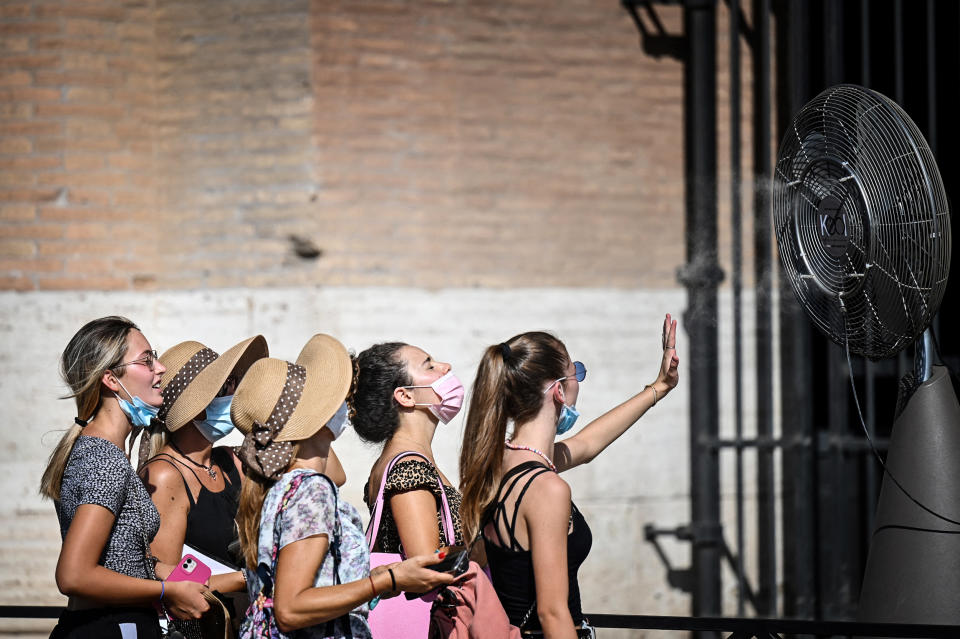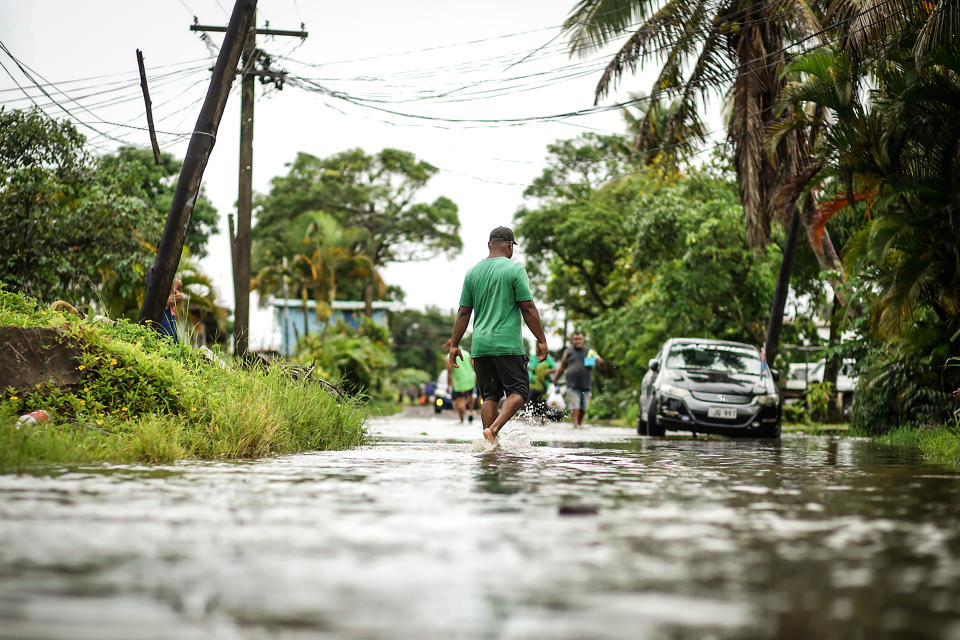The U.N. climate report paints a dark picture of the future. Here are 7 key takeaways.
A landmark report released Monday by the United Nations paints a grim picture of the devastating toll that climate change is already taking on humans and ecosystems in every corner of the planet.
The alarming assessment, produced by a global consortium of 270 scientists as part of the U.N.'s Intergovernmental Panel on Climate Change, or IPCC, is a comprehensive analysis of how extreme weather events, rising seas and other effects of global warming are threatening communities and the natural environment — and the future consequences, if the world does not act quickly to reduce greenhouse gas emissions.
U.N. Secretary-General António Guterres called the more than 3,600-page report "an atlas of human suffering" and a "damning indictment of failed climate leadership."
"I know people everywhere are anxious & angry," he tweeted Monday. "I am, too. It's time to turn rage into #ClimateAction."
Here are seven key takeaways from the latest IPCC report.
The effects of climate change are playing out faster than humans and ecosystems can adapt
The assessment warned that global warming has already caused some irreversible shifts, "as natural and human systems are pushed beyond their ability to adapt."
Extreme events such as droughts, heat waves and floods are expected to increase in a warming world, posing widespread and pervasive threats to humans, infrastructure and natural environments around the world.

"One of the most striking conclusions in our report is that we're seeing adverse impacts being much more widespread and being much more negative than expected," said Camille Parmesan, an adjunct professor of geological sciences at the University of Texas at Austin who was one of the authors of the IPCC report.
In some cases, global warming has already caused irreversible changes by altering the stability of terrestrial and marine ecosystems and driving species to extinction. Even in the best-case scenario, in which warming is limited to 1.5 degrees Celsius (2.7 degrees Fahrenheit), up to 14 percent of species will likely face a "very high risk of extinction," the report found.
The availability of food will be a big issue
Extreme events, such as droughts and floods, have already exposed millions of people around the world to acute food and water insecurity, particularly in Africa, Asia, Central America, South America, the Arctic and small island nations, according to the report.
Climate change is also affecting the health of fisheries, soil and crops, all of which threaten to destabilize food supplies in the future.
"Overall, the picture is stark for food systems," said Rachel Bezner Kerr, a professor of global development at Cornell University and one of the authors of the report. "No one is left unaffected by climate change."
Global warming poses a major risk to human health
Climate change is already causing death and suffering around the world, the report found. Billions of people are facing threats from severe heat waves and other extreme weather events, along with mounting food and water insecurity.
A growing body of research has identified an increased risk of lung and heart diseases in populations exposed to wildfire smoke. Rising temperatures and increased rainfall could also expose communities to dengue fever and other mosquito-borne diseases as the insects expand their range, the report found.
For the first time, the IPCC report also linked climate change with mental health issues, analyzing ways that extreme weather events and other climate-related threats to people's lives and livelihoods can affect mental well-being.
Kristie Ebi, a professor of global health at the University of Washington and one of the report’s authors, said more funding is needed to create more resilient communities and health care infrastructure around the world.
"People are suffering and dying right now from climate change, and we're not seeing an investment to try and make sure that we are prepared for an even warmer future," she said.
Poor communities are the most vulnerable
The report outlined that while no one is immune to the effects of climate change, the hardest-hit people and places are the ones least able to cope. Poorer countries that have contributed the least to human-caused climate change are being disproportionately affected by global warming, with lower-income populations, Indigenous communities, women and children bearing the greatest burdens.
Climate change also exacerbates social inequalities within countries and is expected to widen the gap between rich and poor nations.
The most vulnerable regions of the world include sub-Saharan Africa, Central America, South America and parts of Asia, according to the IPCC assessment. Pacific Islanders and residents of other small island nations are also facing significant risks from extreme weather and rising sea levels.

There are limits to adaptation
The report highlighted that societies can adapt to a changing climate, but building resilient infrastructure and communities will take significant investments.
Cities, in particular, can be at the forefront of adaptation by funding renewable energy infrastructure, sustainable transportation systems and greener housing alternatives, according to the assessment.
The scientists warned, however, that some communities are "maladapting," or enacting measures that do more harm than good. Some of these misguided efforts at adaptation include building sea walls in order to continue developing low-lying coasts or investing in short-term, reactive ways to cope with extreme weather events, rather than more holistic, proactive approaches.
Time is running out
The report found that while certain climate shifts are already irreversible, the various threats from global warming — and their severity — are magnified with each incremental increase in temperature. As such, aggressively reducing greenhouse gas emissions to slow the pace of climate change is of the utmost importance, according to the scientists.
Without urgent action, the consequences for human well-being and the health of the planet will be dire, said Hans-Otto Pörtner, a climatologist and co-chair of the IPCC’s Working Group II, which produced the report.
"Any further delay in concerted global action will miss a brief and rapidly closing window to secure a livable future," he said.
The situation isn't completely hopeless
The IPCC's latest assessment offered a bleak outlook for a warming world, but all hope is not lost. In addition to the adaptations discussed in this analysis, the IPCC is set to release in April its Working Group III report on possible ways to mitigate climate change.
"I think the silver lining is that we can still do something about it," said Stephanie Roe, global lead scientist for climate and energy at the World Wildlife Fund.
Roe, who was not involved with the Working Group II report, said governments should do whatever they can to limit warming to 1.5 degrees Celsius and heed yearly emissions targets.
"It's really important that we keep our eyes on the prize," she said. "We need to focus on what we can do to lessen these impacts and make sure we don't squander this opportunity."

